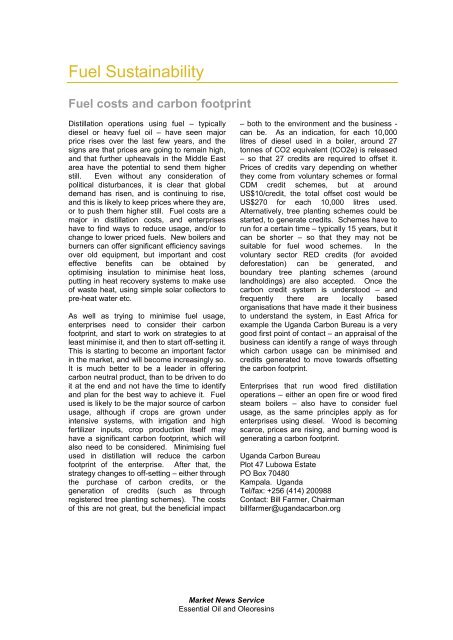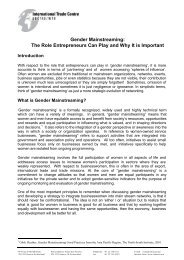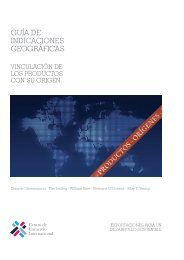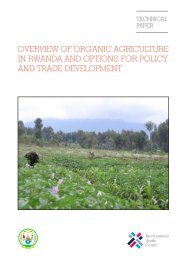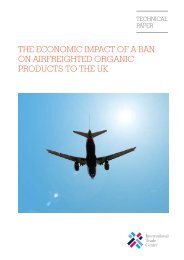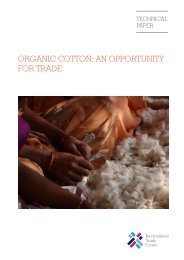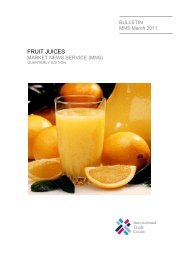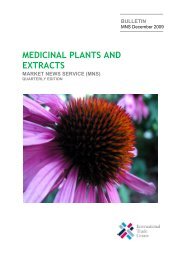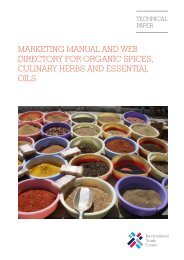Market News Service - International Trade Centre
Market News Service - International Trade Centre
Market News Service - International Trade Centre
Create successful ePaper yourself
Turn your PDF publications into a flip-book with our unique Google optimized e-Paper software.
Fuel Sustainability<br />
Fuel costs and carbon footprint<br />
Distillation operations using fuel – typically<br />
diesel or heavy fuel oil – have seen major<br />
price rises over the last few years, and the<br />
signs are that prices are going to remain high,<br />
and that further upheavals in the Middle East<br />
area have the potential to send them higher<br />
still. Even without any consideration of<br />
political disturbances, it is clear that global<br />
demand has risen, and is continuing to rise,<br />
and this is likely to keep prices where they are,<br />
or to push them higher still. Fuel costs are a<br />
major in distillation costs, and enterprises<br />
have to find ways to reduce usage, and/or to<br />
change to lower priced fuels. New boilers and<br />
burners can offer significant efficiency savings<br />
over old equipment, but important and cost<br />
effective benefits can be obtained by<br />
optimising insulation to minimise heat loss,<br />
putting in heat recovery systems to make use<br />
of waste heat, using simple solar collectors to<br />
pre-heat water etc.<br />
As well as trying to minimise fuel usage,<br />
enterprises need to consider their carbon<br />
footprint, and start to work on strategies to at<br />
least minimise it, and then to start off-setting it.<br />
This is starting to become an important factor<br />
in the market, and will become increasingly so.<br />
It is much better to be a leader in offering<br />
carbon neutral product, than to be driven to do<br />
it at the end and not have the time to identify<br />
and plan for the best way to achieve it. Fuel<br />
used is likely to be the major source of carbon<br />
usage, although if crops are grown under<br />
intensive systems, with irrigation and high<br />
fertilizer inputs, crop production itself may<br />
have a significant carbon footprint, which will<br />
also need to be considered. Minimising fuel<br />
used in distillation will reduce the carbon<br />
footprint of the enterprise. After that, the<br />
strategy changes to off-setting – either through<br />
the purchase of carbon credits, or the<br />
generation of credits (such as through<br />
registered tree planting schemes). The costs<br />
of this are not great, but the beneficial impact<br />
<strong>Market</strong> <strong>News</strong> <strong>Service</strong><br />
Essential Oil and Oleoresins<br />
– both to the environment and the business -<br />
can be. As an indication, for each 10,000<br />
litres of diesel used in a boiler, around 27<br />
tonnes of CO2 equivalent (tCO2e) is released<br />
– so that 27 credits are required to offset it.<br />
Prices of credits vary depending on whether<br />
they come from voluntary schemes or formal<br />
CDM credit schemes, but at around<br />
US$10/credit, the total offset cost would be<br />
US$270 for each 10,000 litres used.<br />
Alternatively, tree planting schemes could be<br />
started, to generate credits. Schemes have to<br />
run for a certain time – typically 15 years, but it<br />
can be shorter – so that they may not be<br />
suitable for fuel wood schemes. In the<br />
voluntary sector RED credits (for avoided<br />
deforestation) can be generated, and<br />
boundary tree planting schemes (around<br />
landholdings) are also accepted. Once the<br />
carbon credit system is understood – and<br />
frequently there are locally based<br />
organisations that have made it their business<br />
to understand the system, in East Africa for<br />
example the Uganda Carbon Bureau is a very<br />
good first point of contact – an appraisal of the<br />
business can identify a range of ways through<br />
which carbon usage can be minimised and<br />
credits generated to move towards offsetting<br />
the carbon footprint.<br />
Enterprises that run wood fired distillation<br />
operations – either an open fire or wood fired<br />
steam boilers – also have to consider fuel<br />
usage, as the same principles apply as for<br />
enterprises using diesel. Wood is becoming<br />
scarce, prices are rising, and burning wood is<br />
generating a carbon footprint.<br />
Uganda Carbon Bureau<br />
Plot 47 Lubowa Estate<br />
PO Box 70480<br />
Kampala. Uganda<br />
Tel/fax: +256 (414) 200988<br />
Contact: Bill Farmer, Chairman<br />
billfarmer@ugandacarbon.org


